In 2022 Duke's Department of Surgery ranked first in research funding from the National Institutes of Health, for the second year in a row.
We owe this accomplishment not only to our principal investigators, clinician-scientists, and research laboratory staff, but to the teams across the department who commit to making Duke Surgery a premier institution for clinical care, surgical training, and scientific discovery.
Over the next few weeks, we'll celebrate our number one status by sharing glimpses (in no particular order) of how our fantastic Duke Surgery teams made this achievement possible.
Keep following along as we update this page with more recognitions across the department!
1. A Drive for Innovation
From the department's earliest days, Duke researchers have pushed the boundaries of what was previously thought possible: from using ultraviolet light to sanitize operating rooms, to discovering the first antiretroviral treatment to combat HIV.
Today, this tradition of excellence in innovative research and novel scientific discovery continues in laboratories across the institution, often leading to groundbreaking clinical treatments.
The department's year-over-year increase in funding, with $102 million in the FY '22 research funding portfolio, represents a commitment to innovative, impactful research, and a universal interest in the questions our researchers attempt to answer.
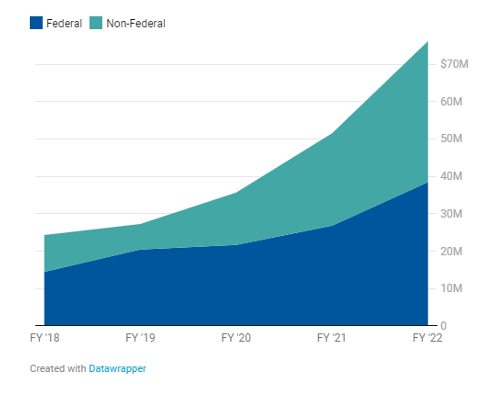
2. A Passion for Serving All Patients
While groundbreaking procedural research is being conducted, it is equally as important to evaluate who the patients are that have access to receive the resulting treatments.
Expanding patient access to care has been at the forefront of the department's efforts in recent years, paving the way for procedural research to be conducted and implemented in real time for patients in need.
Through expanding our geographical footprint across rural North Carolina and partnering with Central Carolina Surgery in Greensboro, conducting research on healthcare disparities, evaluating cultural complications in education, and establishing global surgery research initiatives, our researchers and clinicians have proven their dedication to addressing, and eliminating, inequities in patient care.
3. Interdisciplinary Collaboration
Duke Surgery researchers understand the unique advantage of having the ability and opportunity to collaborate with colleagues across the department along with across other disciplines across Duke, the U.S., and the globe.
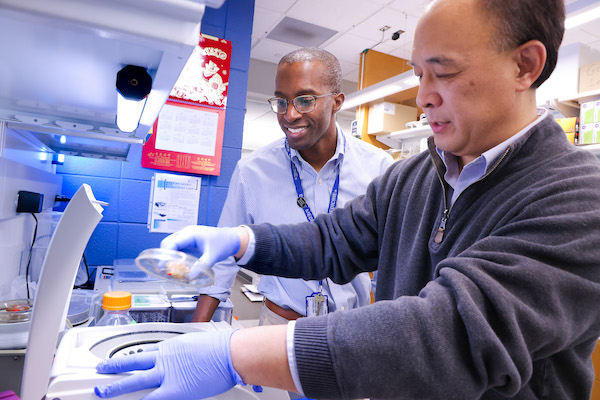
Chief of Vascular and Endovascular Surgery Dr. Dawn Coleman described it this way when she joined Duke last fall: "One thing I noticed here is that everybody is really, fiercely loyal and accountable to Duke and to each other. That's a very powerful and cohesive bond."
This cohesion involves crucial collaboration with and support from departmental colleagues who provide valuable input, mentorship, and guidance. Duke Surgery researchers know that successful research is a team sport.
4. Dedicated Research Administrators
The various groups and individuals that provide daily support to Duke researchers are crucial to driving the success of the department's research operations.
From the teams within the Surgery Research Administration Office to project managers across our investigators' laboratories, research administrators conduct a range of activities including assisting with grant proposal submissions, managing funding resources, ensuring critical regulatory standards are being met, collecting and analyzing the story that data tells, and so much more.
Their hard work and dedication allows Duke to continue to conduct impactful, important research.
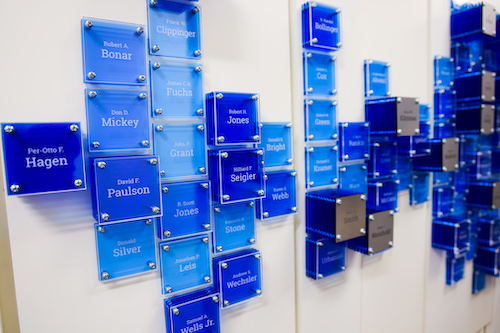
The communications and research administration teams are currently updating the "100 Years of Research in Duke Surgery" exhibit on the 7th floor of HAFS. The updates will be completed by April 2023.
Learn more about the display and its installation here.
5. Continuous Professional Development and Eagerness to Learn
Even as experts in their fields, Duke surgeons, clinicians, and scientists are never done learning. Conducting research and making advancements in patient care requires a dedication to not just informing new discoveries and techniques, but learning from others as well.
Professional development spans from writing and publishing peer-reviewed manuscripts and papers, hearing from and presenting research to expert colleagues at conferences, finding new and innovative ways to educate the next class of trainees, and even enlisting the expertise and advice of a Duke legend as part of the residents conference's redesigned professionalism and ethics lecture series.
6. Mentorship Between Faculty and Trainees
Duke Surgery faculty serve as mentors to trainees across the department, including those hoping to become involved in important research efforts, or how to begin conducting their own research to address their own interests.
Through opportunities like the T32 Surgeon–Scientist Training Program and trainee research awards, our faculty invest their knowledge, expertise, and resources in the new generation of surgeon–scientists who each bring valuable ideas and ask difficult questions to contribute to meaningful research across various fields.
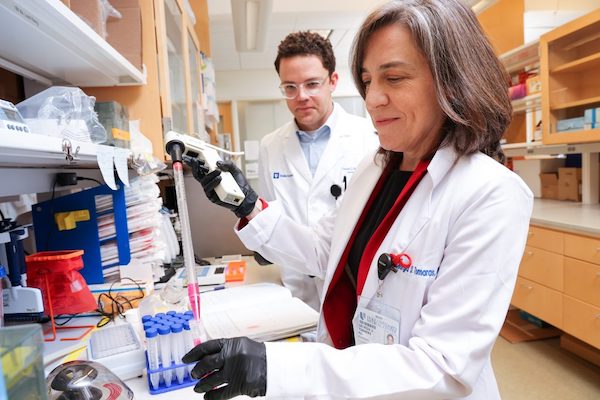
Trainees also have the advantage of learning from faculty mentors who provide guidance and support when mastering surgical techniques, how to effectively and efficiently care and advocate for patients, and how to grow into their careers to carve their own unique paths.
7. Clinicians and Clinical Staff Dedicated to Advancing Patient Care
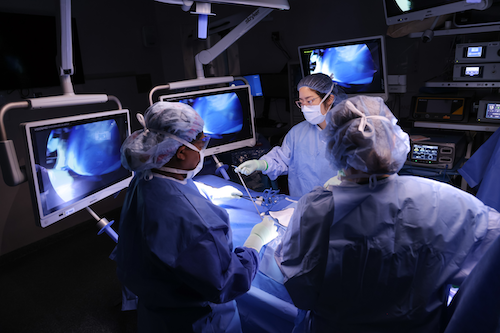
The scores of people that make up the Duke Surgery clinics are continuously working to ensure that patients across the state receive timely, quality care. Often, this involves working long hours, caring for patients in rural or underrepresented communities, and being able to quickly and efficiently adapt to change.
Clinicians and clinical staff are also essential to the continued success of research at Duke. These teams enroll patients in clinical trials, integrate new technologies that allow for better data-driven clinical decision making, and implement treatments and solutions gleaned from Duke Surgery research in real time.
8. Commitment to Serving our Communities
As part of a leading hospital system in the country and state, Duke Surgery has for decades proudly provided Durham County, surrounding cities and neighborhoods, and anyone who seeks it with timely, quality surgical care.
Evident in the department's annual case volumes and our expanding service offering, Duke is responsible for serving patients with unique needs and big expectations. Patients depend on Duke Surgery for their care, and in turn our teams dedicate themselves to discovering and providing solutions to our patients' medical problems.
We handle the trust our patients place in us with as much care as we place their health.
9. You.
Simply put, Duke Surgery would not be here without you.
No matter whether you have been a member of our team for ten years or ten days, whatevery your specialty or role, this acievement—and all of our achievements as a department—would not be possible without the hard work, dedication, and expertise of every single individual who calls Duke Surgery 'home.'
We are grateful to have a strong community of Duke Surgery faculty, learners, and staff that continue to support each other and advance our mission and goals as caregivers and innovators.
Thank you for all you have done, and all you continue to do!
Related Stories, News, and Recognition
"Resilience and Dedication of Project Managers Helps Keep CAVIMC Moving Forward"
By: Duke Surgery Communications | April 6, 2022
"Duke Surgery Announces New Co-Directors of Surgical Education and Activities Lab"
By: Duke Surgery Communications | August 25, 2022
"Duke Health Performs World's First Partial Heart Transplant"
By: Duke Today | September 8, 2022
"Federal Grant to Duke University School of Medicine Expands HIV Research"
By: Duke Health News | October 11, 2022
"Studying Surgical Care Across an Ocean"
By: Duke Global Health Institute | October 24, 2022
"One Year In: A Look at Duke Surgery's Training Partnership with Central Carolina Surgery"
By: Duke Surgery Communications | October 27, 2022
"Newly Developed Gene Classifier Identifies Risk of Breast Pre-Cancer Progression"
By: Duke Health News | November 18, 2022
"Coack K Speaks at General Surgery Residents Conference"
By: Duke Surgery Communications | November 21, 2022
"Past and Present: Understanding this Important Link in Immunology Research and Training"
By: Duke Surgery Communications | December 2, 2022
"Full Circle: When the Trainees Become the Teachers as Faculty Surgeon–Scientists"
By: Duke Surgery Communications | December 2, 2022
"Duke Human Vaccine Institute Wins Contract to Produce Pan-Coronavirus Vaccine"
By: Duke Health News | January 31, 2023
"A Fair Process: Lisa McElroy Strives to Make Transplant Selection More Equitable"
By: Duke School of Medicine | February 21, 2023
"Cutting Through the Fog: One Patient's 6-Year Journey to Finding Treatment for Primary Hyperparathyroidism"
By: Duke Surgery Communications | February 28, 2023